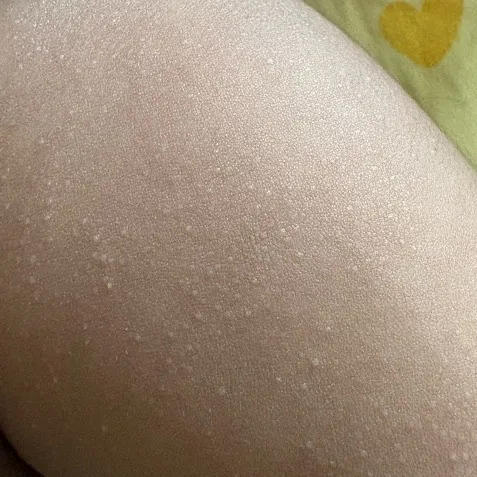![POOJA KOTHARI profile image of POOJA KOTHARI]() POOJA KOTHARIMom of a 8 yr 10 m old boy1 Year ago
POOJA KOTHARIMom of a 8 yr 10 m old boy1 Year agoA. It's not uncommon for newborns to develop various types of skin rashes, especially in the first few months of life. These rashes can be due to several benign and temporary skin conditions. However, it's always important to monitor them closely to ensure they are not signs of something more serious.
Common Skin Issues in 1-Month-Old Babies:
1. Milia: Small, white bumps that can appear on the face, including the nose, chin, or cheeks. These are harmless and usually disappear on their own within a few weeks.
2. Neonatal Acne: Some babies develop pimples or small red bumps on their face, chest, or back in the first few weeks. This is typically caused by hormones passed from the mother during pregnancy and is usually temporary.
3. Erythema Toxicum: A common rash in newborns that looks like red spots or blotches with a yellowish center. It usually appears within the first few days or weeks of life and goes away on its own within a week or two.
4. Heat Rash (Miliaria): Small, red bumps or blisters that can develop when babies become overheated. They may appear in areas like the neck, chest, or thighs, especially if they are overdressed or in a warm environment.
5. Diaper Rash: Though more common in the diaper area, it can sometimes spread to the thighs and other areas due to friction or moisture.
When to Seek Medical Attention:
Persistent or spreading rash: If the rash worsens or spreads quickly, it's a good idea to consult your pediatrician.
Signs of infection: If the boils or bumps become swollen, warm, or filled with pus, or if there is any discharge.
Fever or discomfort: If your baby develops a fever, seems to be in pain, or is unusually irritable.
Change in appearance: If the rash looks different from typical baby rashes, or if it starts to peel, blister, or form scabs.
In general, most rashes in newborns are harmless and resolve on their own. However, it’s always wise to reach out to your pediatrician to get a professional opinion if you're concerned. They can provide an accurate diagnosis and recommend the best treatment if needed.





.svg)
.svg)
.png)











Post Answer